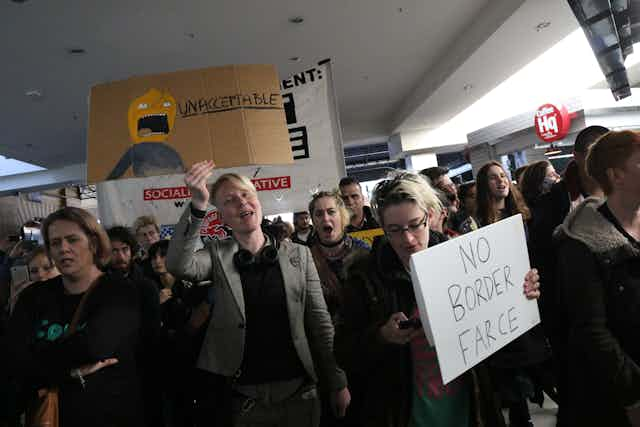Australian governments have, over the last few years, passed laws that explicitly, or in their effect, breach fundamental human rights.
Not only have our parliaments failed to exercise their traditional restraint to protect common law freedoms and liberties, they’ve also allowed the executive government to expand its discretionary powers and, increasingly, excluded the courts and judges from exercising judicial scrutiny or control.
Parliaments all too often ignore the separation of powers doctrine. The government’s uncontested assessment of national interest and security often trumps the rule of domestic and international law, as well as Australia’s obligations under human rights treaties.
Politics of fear
Operation Fortitude provides a powerful example of executive overreach in civilian affairs. The recently merged Department of Immigration and Border Protection’s Operation Fortitude was to involve a number of agencies – including Victoria Police, Yarra Trams, Metro Trains, the Sherriff’s Office, Taxis Services Commission and the Australian Border Force – targeting crimes ranging from “anti-social behaviour” to outstanding arrest warrants. It was cancelled after a community outcry.
It is but one example of the tendency to increase executive power and to criminalise behaviour that, in the past, might have attracted a civil fine.
Australian governments have introduced, and parliaments have passed, scores of laws that infringe common law freedoms of speech, association and movement, the right to a fair trial and the prohibition on arbitrary detention.
These new laws undermine a healthy, robust democracy, especially when they grant discretionary powers to executive governments in the absence of meaningful judicial scrutiny.
What explains Australia’s move to restrictive approaches to our fundamental freedoms and human rights over the last few years?
There’s a conflation in the public mind of the events of 2001 – the Tampa crisis, the “Children Overboard” claims and the September 11 terrorist attacks.
Since these events 14 years ago, governments and political leaders have played on community fears of terrorism and the unauthorised entry of refugees to concentrate power in the hands of the executive – to the detriment of Australian liberty.
Dubious laws
Particularly troubling is the phenomenon of the major political parties agreeing with each other to pass laws that threaten the fundamental rights and freedoms Australia has inherited from its common law tradition.
Compounding the concentration of power in the executive’s hands is the recent increasing militarisation of government and the criminalisation of behaviour that has not hitherto been the subject of criminal penalties. This includes:
Counter-terrorism laws: metadata retention and law enforcement agencies’ access to that data without a warrant or independent or judicial authorisation and oversight.
Criminalisation of Australians who enter “declared areas” in Syria and Iraq, and placing the burden of providing a legitimate reason on the accused.
Cancellation of visas and mandatory detention of those who become unlawful non-citizens by, for example, failing the new character test, which depends on the minister’s suspicion that even minor offences have occurred. All this coupled with the minister’s power to overturn Administrative Appeals Tribunal decisions.
Lengthy administrative detention of the mentally ill or those unfit to plead without trial.
Operation Sovereign Borders and secrecy of “on-water activities”.
Secrecy laws under the Australian Border Force Act that criminalise all immigration workers, consultants and service providers who disclose “protected information” – an offence that attracts a penalty of two years’ imprisonment.
Legislative exclusion from the Administrative Decisions (Administrative Review) Act of decisions under counter-terrorism, national security and migration laws.
Whither protection?
It might be thought that Australians can rely on their courts to protect common law liberties. Judges have employed the principle of “legality” to adopt a restrictive interpretation of legislation to protect common law freedoms.
Laws passed by parliament are not to be construed as abrogating fundamental common law rights, privileges and immunities in the absence of clear words or unmistakable and unambiguous language.
But, as our laws are now drafted with such precision – or are so constantly amended – ambiguities are increasingly hard for the courts to find.
Historically, parliament has been the bulwark against sovereign or executive power. But law professor George Williams estimates there are now more than 350 Australian laws that infringe fundamental freedoms. He suggests prioritising governmental power has become a “routine part of the legislative process”, stimulating little community or media responses.
And an Australian Law Reform Commission interim report on rights and freedoms in Commonwealth laws has confirmed this assessment.
One of Australia’s most effective safeguards of human rights is the cultural expectation that freedoms will be protected. Most Australians are unlikely to be able to describe the doctrine of the separation of powers. But they’re quick to assert their liberties under the rubric of a “fair go” – a phrase that’s as close to a bill of rights as Australia is likely to get.
This cultural expectation is what keeps our freedoms alive today – as was illustrated by the overwhelming community response to Operation Fortitude. And to preserve Section 18C of the Racial Discrimination Act when the Abbott government proposed stripping out legislative provisions protecting ethnic groups from hate speech.
But the scores of laws passed recently that infringe our rights have confirmed my view that Australia needs a legislated Charter of Rights. If we had such rights enshrined in the Constitution, laws that infringe them could easily be repealed or amended.
This article is an edited extract of the Blackshield Lecture, delivered by Professor Triggs on November 5, 2015. It’s part of a series on breaking political conventions. Look out for more articles exploring various political conventions in the coming days.

